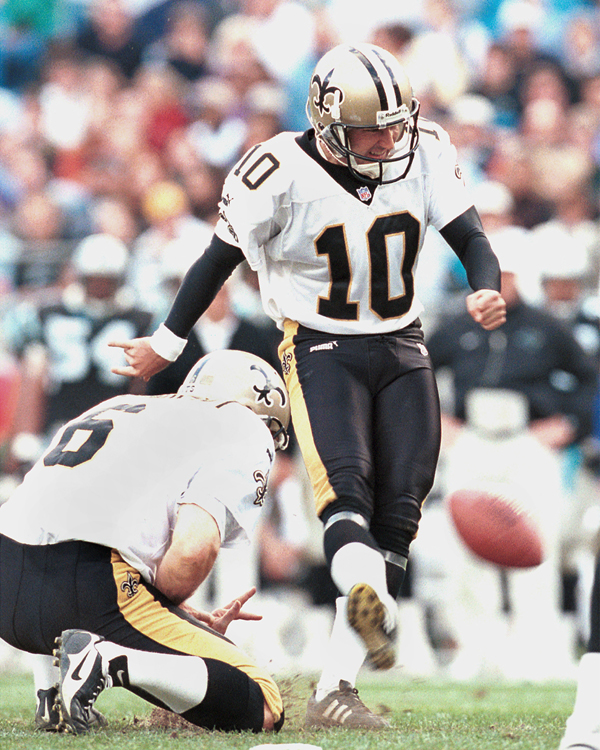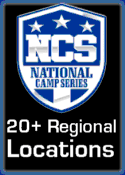|
KICKING FOR ADVANCED
In the previous sections I have discussed only the physical aspects of kicking. If only those physical techniques are mastered, you will have a tough time progressing beyond anything more than an average college kicker -- and that is assuming you are blessed with a strong leg. To raise your kicking game to a higher level, the mental side of the game must be developed.. In my opinion, kicking is 90 percent mental. No matter how far, or how consistent someone can kick a ball in practice, they are not going to be successful unless they can do it when it counts, in the game! To perform consistently well in games, a kicker must develop an extraordinary ability to concentrate. A great kicker has the capacity to stay positive no matter what the situation. Even after missing the previous two attempts in a game, the mentally tough kicker can calmly knock through the game winner. This skill will come quickly to those of an even-keeled nature, but still a lot of hard work needs to be done to continually be able to focus better and better. "Baseball was for me, too, a form of spirit-discipline, a way to make myself a better person-although I surely never sought discipline for such a reason. It became my Way, as the tea ceremony or flower arranging or the making of poems were the Ways of others." - Sadaharu Oh There are two things that I recommend working on to improve the mental game. First, is visualization or positive thinking. This is simply seeing yourself performing well. By spending 10 to 15 minutes a day, closing your eyes and watching yourself make kick after kick, you can make a real improvement. The more real you can make these situations in your head the better. Feeling the crowd noise and the pressure of the situation and then calmly making your kick, helps to raise your confidence and your ability to be positive and successful when these situations come up in a game. Concentration drills are also very helpful in improving your mental game. If you tried visualization than you have actually already done some serious concentrating. Visualizing a successful kick is only possible with intense concentration. It is very easy to let distracting thoughts into your head and ruin the positive effect of visualizing. A good drill to practice specifically on concentration is simply to stare at a football. The idea is to get to know the "sweet spot" (the ideal place to make contact) on the ball. The drill is to literally stare at the sweet spot on the ball. When totally focused on that spot, think about how it feels to make solid contact with that spot. How it feels to hit the sweet spot and send the ball right down the middle of the uprights. After doing this exercise for 5-10 minutes a day, you will eventually be able to see positive images of kicking just by concentrating on the "sweet spot" of the ball. After getting more advanced I recommend doing this drill during practice or even during a game to get yourself focused on what you have to do. The ability to concentrate without letting any interfering thoughts enter your mind is the secret to successful kicking. Both of the drills I have discussed are very helpful in improving your mental game. I have done extensive work to improve my mental game. "When you find that burning flame within yourself, action becomes facilitated in athletics, in playing a musical piece on the piano, or in performance of any kind. If you hold to that still place within yourself while engaged in the field, your performance will be masterly. That's what the Samurai does. And the real athlete." - Joseph Campbell I currently work with a mental coach named Joel Kirsch at The American Sport Institute. He has me doing various concentration drills for about an hour a day, five days a week. Part of my regime is a 40-minute meditation to help train my mind to concentrate. I have been following Joel's program for three years now and my kicking has continually improved. Another crucial element in Joel's program is reading. He has recommended many books to help me understand the Zen philosophy, the mental side of sports and other philosophical concepts to increase my awareness of my kicking and my life in general. Recommended list of books for mental training >>> I hope that some of the tips I've given help you. If some of my suggestions have been of value or if you have any questions please send an email and let me know. I would love to hear what you think so I can continually make this page more useful. Remember, this is just a fraction of the information you will receive with a Kicking.com Membership. For just a few bucks a month, you will have access to all the drills, workouts, diets, lifts, resources, experts, etc.you can think of to make yourself a better kicker or punter. Give us a try. You can pay monthly if you're not convinced... The "right art," cried the Master, "is purposeless, aimless! The more obstinately you try to learn how to shoot the arrow for the sake of hitting the goal, the less you will succeed in the one and the further the other will recede. What stands in your way is that you have much too willful will. You think that what you do not do yourself does not happen." - Eugen Herrigel, Zen in the Art of Archery
|






 Doug and Tommy's Frequently Asked Questions
Doug and Tommy's Frequently Asked Questions




